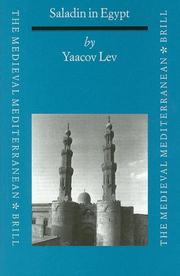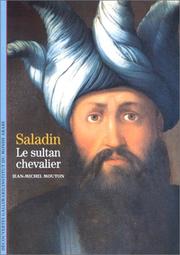| Listing 1 - 4 of 4 |
Sort by
|
Book
ISBN: 9780199646951 Year: 2015 Publisher: Oxford Oxford University Press
Abstract | Keywords | Export | Availability | Bookmark
 Loading...
Loading...Choose an application
- Reference Manager
- EndNote
- RefWorks (Direct export to RefWorks)
On 4 July 1187 the legendary Muslim leader Saladin destroyed the Crusader army of the Latin Kingdom of Jerusalem with a terrible slaughter at the battle of Hattin - and went on to restore the Holy City of Jerusalem to Islamic rule. The carnage at Hattin was the culmination of almost a century of religious wars between Christians and Muslims in the Holy Land. It had enormous consequences for the whole medieval world because it produced an intensification of holy war between Islam and Europe for over another century - and in retrospect marked the beginning of the end for the Crusader presence in the Middle East. In the 20th century memory of the battle was revived as a symbol of Arab hope for liberation from Crusader-Imperialism, and in the 21st it has become a rallying cry for radical Muslim fundamentalists in their struggle for the soul of Islam. In this new volume in the 'Great Battles series', John France analyses the origins and course of this pivotal battle, illuminating the roots of the bitter hatred which underlay it, and explains its significance in world history - from medieval times to the present.

ISSN: 09285520 ISBN: 9004112219 9004476806 9789004112216 9789004476806 Year: 1999 Volume: v. 21 Publisher: Leiden: Brill,
Abstract | Keywords | Export | Availability | Bookmark
 Loading...
Loading...Choose an application
- Reference Manager
- EndNote
- RefWorks (Direct export to RefWorks)
The rise of Saladin to power in Egypt is a chapter of both Mediterranean and Islamic history. In the period covered by this study, the second half of the twelfth century, profound changes took place in the Eastern Mediterranean affecting the history of the region. The book is divided into two parts. The first deals with the rise of Saladin to power in Egypt (1169-1174) and offers a new interpretation for the demise of the Fatimid state. The second part deals with topics such as the formation of Saladin's army in Egypt, the creation of the navy and the role of the navy in the battle for Acre. The author also addresses topics such as the religious policies of Saladin in Egypt and his attitudes toward the non-Muslim communities.
Saladin --- Egypt --- History --- Saladin, 1171-1193 --- Saladin, --- Saladin, Sultan of Egypt and Syria, 1137-1193

ISBN: 2070762084 9782070762088 Year: 2001 Volume: 409 Publisher: Paris: Gallimard,
Abstract | Keywords | Export | Availability | Bookmark
 Loading...
Loading...Choose an application
- Reference Manager
- EndNote
- RefWorks (Direct export to RefWorks)
Au XIIᵉ siècle, Saladin, prince kurde et fondateur de la dynastie ayyoubide, entreprend d'unifier à nouveau le monde musulman sous son autorité et de reconquérir les territoires des États latins d'Orient. Soutenu par sa famille, il étend son Empire des marges du Maghreb à la Jazira en passant par l'Égype et de la Syrie du Nord au Yémen. Saladin est sans doute l'un des personnages les plus célèbres de l'histoire du monde musulman médiéval, aussi bien du côté arabe qu'occidental. Cette renommée tient essentiellement à la reconquête de Jérusalem qu'il effectua en 1187 aux dépens des croisés. Cet épisode, savamment exploité par la propagande officielle, fit de Saladin à son époque et dans les siècles suivants le héros incontesté du djihâd, le protecteur des lieux saints de l'islam et du territoire musulman en général. Jean-Michel Mouton retrace la vie de ce prince d'Orient.
Saladin --- Syria --- Egypt --- Kings and rulers --- History --- Rois et souverains --- islam --- 1193 --- Saladin, --- Biographies. --- Empire islamique --- Égypte --- Histoire --- Syria - Kings and rulers --- Egypt - History - Saladin, 1171-1193 --- Egypt - Kings and rulers --- Syria - History - 750-1260
Book
ISBN: 0199646953 0191668966 0191668958 9780191668951 9780199646951 Year: 2015 Publisher: Oxford New York Oxford University Press
Abstract | Keywords | Export | Availability | Bookmark
 Loading...
Loading...Choose an application
- Reference Manager
- EndNote
- RefWorks (Direct export to RefWorks)
On 4 July 1187 the legendary Muslim leader Saladin destroyed the Crusader army of the Latin Kingdom of Jerusalem with a terrible slaughter at the battle of Hattin - and went on to restore the Holy City of Jerusalem to Islamic rule. The carnage at Hattin was the culmination of almost a century of religious wars between Christians and Muslims in the Holy Land. It had enormous consequences for the whole medieval world because it produced an intensification of holy war between Islam and Europe for over another century - and in retrospect marked the beginning of the end for the Crusader presence in the Middle East. In the 20th century memory of the battle was revived as a symbol of Arab hope for liberation from Crusader-Imperialism, and in the 21st it has become a rallying cry for radical Muslim fundamentalists in their struggle for the soul of Islam. In this new volume in the 'Great Battles series', John France analyses the origins and course of this pivotal battle, illuminating the roots of the bitter hatred which underlay it, and explains its significance in world history - from medieval times to the present.
Hattin, Battle of, Israel, 1187. --- Saladin, --- Islamic Empire --- Jerusalem --- History --- Ḥiṭṭīn, Battle of, 1187 --- Horns of Hattin, Battle of, Israel, 1187 --- Tiberias, Battle of, Israel, 1187 --- Al-Ayubi, Salahudeen, --- Ayubi, Salahudeen Al-, --- Ayyūbī, Ṣalāḥ al-Dīn, --- Saladino, --- Salah ad-Din Yusuf, --- Ṣalāḥ al-Dīn al-Ayyūbī, --- Salah al-Din Yusuf ibn Ayyub, --- Salâhaddı̂n Eyyûbı̂, --- Salahudeen Al-Ayubi, --- Selahdînê Eyûbî, --- ايّوبى، يوسف سلطان صلاحالدّين، --- السلطان صلاح الدين --- سلاح الدين، --- صلاح الدين --- صلاح الدين الأيوبي --- صلاح الدين الايوبي، --- صلاح الدين, --- صلاح الدين، --- Aĭi︠u︡biĭ, Salaḣ ad-din, --- Айюби, Салах ад-дин, --- Aĭi︠u︡biĭ, Saloḣiddin, --- Айюби, Салoxиддин, --- Ibn Ai︠u︡b, Salakh ad-din I︠U︡suf, --- Ибн Айюб, Салах ад-дин Юсуф, --- Latin Kingdom of Jerusalem --- Latin Orient --- Palestine --- Hattin, Battle of, Israel, 1187 --- Saladin, 1171-1193
| Listing 1 - 4 of 4 |
Sort by
|

 Search
Search Feedback
Feedback About UniCat
About UniCat  Help
Help News
News